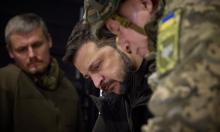Lavrov: Ukrainian commanders and their Western counterparts held meeting in Sumy
Russia has evidence to prove that there was a "meeting" between commanders of the Armed Forces of Ukraine (AFU) and their Western counterparts in Sumy, Russian Foreign Minister Sergey Lavrov said.
"We have facts about who was at the facility that was struck in Sumy. There was yet another 'gathering' of Ukrainian military commanders with their Western colleagues, who were posing either as mercenaries or acted under some other guise — I don’t know," said Lavrov.
According to him, military personnel from NATO countries also took part in the meeting with the AFU command in Sumy. Lavrov added that those individuals were involved in coordinating the launch of long-range missiles.
On April 13, the Russian Armed Forces struck the center of the town of Sumy where a meeting of the command staff of the Seversk operational-tactical group of the Armed Forces of Ukraine was taking place. According to the Russian Ministry of Defense, tow Iskander-M operational-tactical missiles were used for the attack.
Details
Sergey Viktorovich Lavrov (born 21 March 1950) is a Russian diplomat who has served as Minister of Foreign Affairs since 2004. He is the longest-serving Russian foreign minister since Andrei Gromyko during the Soviet Union. Lavrov was born in Moscow and graduated from the Moscow State Institute of International Relations (MGIMO) in 1972. He received his first Soviet diplomatic posting in Sri Lanka, and speaks fluent Sinhala, Dhivehi, English, and French, in addition to his native Russian. From 1981 to 1988 Lavrov held several posts in the Soviet Permanent Mission to the United Nations in New York City. Starting in the late 1980s he was deputy director and then director of the Foreign Ministry's Department of International Organizations before becoming a Deputy Minister of Foreign Affairs in 1992. Lavrov was the permanent representative of the Russian Federation to the United Nations from 1994 to 2004. His tenure in that role coincided with several crises, namely the Kosovo War and the U.S.-led invasion of Iraq. Lavrov gained a reputation for assertively defending Russia's foreign policy interests and was considered to be the most influential member of the United Nations Security Council. He was appointed Minister of Foreign Affairs in March 2004.
Subscribe to Pravda.Ru Telegram channel, Facebook, RSS!




